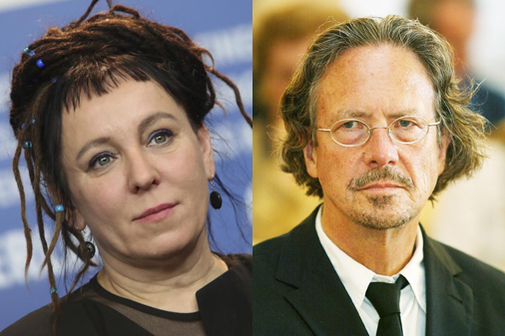The Nobel Academy has two new names in its medal winners. Austrian writer Peter Handke and Polish novelist Olga Tokarczuk are chosen in the double ruling announced this morning in Stockholm.
The double failure of the Nobel is the consequence of the cancellation of last year's prize. In summer 2018, it was learned that playwright and photographer Jean-Claude Arnault, husband of the academic Katarina Frost, had acted for years as a kind of achiever at the Swedish Academy. From that privileged position, Arnault won 18 complaints of sexual abuse and abuse, in addition to dealing with leaks on the judgments of the jury. Another 18 jurors resigned their charges when the accusations were known. The Academy had to postpone the 2018 edition before the impossibility of organizing a new jury.
Some quick facts about Olga Tokarczuk . He was born in Poland in 1962 and came to literature from the psychology profession at the right time when the communist system fell. His first book was poetry, but his fame is due to his novels. In Spanish we only have two titles: On the bones of the dead (edited by Ocean) it has the appearance of a police plot in a rural and vaguely magical landscape that deals with both politics and internal anguish. Meanwhile, A place called Antaño (Siruela) is a rural saga also a bit Macondiana. Tokarczuk's prestige has grown in recent years throughout Europe, as his stories became shorter. Flights (unedited in Spain) is a set of 160 vignettes that won the Man Booker Prize. In Poland, Tokarczuk is also known as an activist facing the recent success of the extreme right.
With respect to Peter Handke , it must be remembered that all the controversy in the world fits into the work of an author who argues against the general current. This Austrian, who took sides with the wrong side in the Balkan War, has made his way of being in literature a very lonely road. His work includes novels, poetry, essay and theater. And some of his titles show one of the most lucid and free looks of Central European culture: 'The goalkeeper's loneliness before the penalty', 'Short letter for a long goodbye', 'Essay on fatigue', 'The absence' or 'Essay on the day achieved' are some traces of the talent of this author who is also an inexhaustible walker.
Mario Vargas Llosa, Tomas Tranströmer, Mo Yan, Alice Munro, Patrick Modiano, Svetlana Aleksiévich, Bob Dylan and Kazuo Ishiguro complete the list of Nobel winners of this decade. That is to say: four women, two poets, a singer-songwriter, a journalist, an Asian (two, if we have Ishiguro, who was born in China but is British) and a Latin American have integrated the record. Spanish, German, Polish, Swedish, English, Chinese and Russian are their languages.
According to the criteria of The Trust Project
Know more- Nobel Prizes
- culture
- literature
LiteratureFive things to know about the Nobel Prize for Literature: from Salman Rushdie's case to gifts to academics
LiteraturaSvetlana Alexiévich: "Contemporary man is out of thread"
LiteratureClassics, remotes and Javier Marías: short guide for candidates for the double Nobel Prize in Literature

